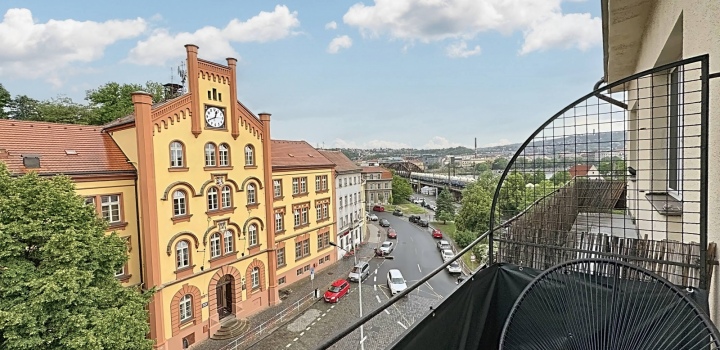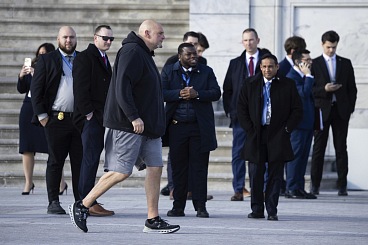Fast Confession - addictologist Martin Vlček: The problem of the coronavirus period are children talking about death
Do you know someone who is mentally unwell? The number of such people is rapidly increasing due to the coronavirus pandemic. Unfortunately. LP-Life.com has therefore interviewed the addictologist and also director of the Center for Psychosomatic Medicine, Martin Vlček. Every day, he meets people who are facing major difficulties due to Covid-19, which made them seek out professional help. Vlček believes that the current increase in the number of patients is only the tip of the iceberg, which is a problem, because in the near future, there won’t be any doctors left who could see them.
How has your addictologist practice changed since last year?
I can say with certainty that there has been an increase in the number of patients who consume larger amounts of alcohol. And the people who used to consume excessive amounts of alcohol are drinking abysmally today.
Even though there’s nowhere to go?
They drink more at home, which is more dangerous because they’re not under the supervision of their peers, so they have no impulse to change. They can drink from morning to evening.
Do you have such clients?
Right now I have a patient who came after a huge conflict, which ended in domestic violence. They used to have a travel agency with her husband, but they’ve been unemployed for over a year, they’re staying at home with their children and they both drink.
In such cases, it strikes me as odd that the people are still reasonable enough to know they need help.
With addictions, people aren’t aware of the severity of their situation for some time. The impetus for change comes not because one suddenly decides to stop drinking, but because something is happening around them. Their family has had enough, they have problems at work, they lose their driver's license. The impetus for change is an impulse that usually comes from the outside environment. Now, suddenly, there are much fewer impulses around us. There is little contact with one’s environment that could show an addict that he’s gone too far. Now they sit at home day and night, without being monitored by anybody, so when they don't have an important online meeting, they drink.
That’s the way alcohol and addictive substances work, one doesn’t see that the situation has gotten out of his hands, but always finds an excuse. And it’s a known fact that when it reaches a more advanced stage, physical addiction also plays a role. When they don't have alcohol or an addictive substance first thing in the morning, they feel sick.
What brought the client to you?
After a major domestic conflict, the police arrived and expelled one of the family members from the apartment, I don't remember if it was she or her husband. That was the impulse when something had to start happening.
How do you start treating such a patient? She has children, she needs to have an income.
It's the same as always. There are different forms of treatment, both inpatient and outpatient treatment is possible. The patients have to choose themselves, although we outline what their options are and give our recommendations. Many patients can handle outpatient attendance, and when alcohol is their problem, they attend outpatient groups. They get a psychiatric evaluation to determine their mental state, if they need some medication. People who are addicted to alcohol can benefit from Antabus.
That’s still a thing? Didn't something better come up?
I never had anything against it. Today, of course, we no longer give people Antabus and force them to drink alcohol so that they’d vomit. That was commonly done in rehabs, but since the 1980s it’s no longer the case. We explain to people what Antabus does when combined with alcohol. We know that abstinence is not enough. If people want to maintain the lifestyle they come here with, addiction belongs to it. If we just eliminate alcohol or an addictive substance, it usually comes back.
I stopped drinking completely just like that, I was doing the Dry February challenge and I thought to myself that I’d prolong it. I’ve been abstaining for two years. It's a period of loss. They think of it as a handicap because they’re disadvantaged. In a society where everyone drinks. But the real handicap is drinking because it is a toxic substance. When people keep the same lifestyle in this phase, because after fourteen days of detox, they feel better and tell themselves that not abstaining feels nice, it doesn’t really solve the problem. The psychological reasons for their drinking haven’t disappeared. So the only chance is changing one’s lifestyle.
I don’t tell my telling patients that abstinence is the main thing, I tell them it’s the quality of life with abstinence. It's pretty similar, but there's a big difference. I don't want to create a bitter, angry abstinent, because the result will be that if he doesn't do well in life, he will return to drinking. We want people to have a quality life with abstinence becoming part of their lifestyle. They have to go from loss to profit, that’s when they can make it.
That’s the model I created when I stopped drinking myself. I thought I would simply stop drinking and that would be it. But after two years, I'm surprised by what all has changed now that I don’t drink. I found out that I was using alcohol everywhere. On vacation, at the weekend house, with friends, all the time. We often fail to realize how toxic alcohol is. I have more energy now, I’m calmer, I don’t get in conflicts, my life is easier. I have come to realize that the benefits and gains of my abstinence are so great that I don't want to go back to drinking.
That’s something all patients have to go through. We know it takes about two years. The first year is abstinence of the will, and then it starts to change. The more we, humans, gain, the better we feel.
How big an increase in alcoholics do you observe?
I’ll speak about addictions in general, not just alcohol. My guess is that their number has doubled during the coronavirus crisis.
How many more do you think there will be?
I think the worst period is still ahead of us. So far, we are all set to believe that maybe it will end one day, we just have to endure it and everything will be fine again. The moment the measures are lifted… when we start running the race for our lives, we’ll keep running as long as we can. But when it’s no longer necessary, we will collapse. People will be exhausted. I think the main increase will happen in the next one, two or three years.
And there won’t be just an increase in patients with addictions, but also in patients with mental illnesses such as depression.
How many people are you able to hospitalize at your clinic? There are people who have nowhere to go.
I am trying to expand the clinic, we are hiring new staff. We started with this clinic a year and a half ago after entering into contractual relations with insurance companies. We still have the capacity to hospitalize more people, although we currently have about 1,100 patients.
In reality, however, there must be many more.
Exactly. That is why I’ve mentioned the problem with insurance companies. They behave as exclusively private entities and do not like to contract new medical facilities. Getting a contract with an insurance company is an absolutely heroic achievement and it took me two years. We even had to open surgeries in Chomutov to achieve this, which enabled us to start putting pressure on insurance companies. You can see for yourself how catastrophic the situation is. For example, a month ago we asked for a contractual relationship with an insurance company for a psychiatric nurse. The answer of Deputy Engineer Šmehlík was that the care is saturated. Without knowing what the care looks like. At the end of the letter, he writes "consider my decision provisionally closed". It’s also impossible to get hold of the man. The farthest you can get to is his assistant, who’ll let you make an appointment, and then they won’t see you. They act as a ruthless private entity, rather than treating us as their contractual partners.
Everyone is surprised when they find out what all needs to be done. Insurance companies should start entering into contractual relationships with emerging facilities. It took me two years to close all the necessary contracts, including psychiatry, addictology, psychologists. The process is extremely lengthy. First, you must go to the City Council to get their approval for the possibility of concluding a contract with an insurance company. However, this approval doesn’t guarantee that you’ll get a contract, because you can still get rejected by the insurance company. But without approval from the City Council, you cannot even apply for a contract with an insurance company. We have a friend who wanted to open an ambulance in Prague 2, it took her five years.
You have already mentioned that there’s also an increase in patients with mental problems. How many are there and what are their problems?
People suffer from anxiety and uncertainty, all kinds of diagnoses that may be related to it are awakening and people have to see experts due to that. People who haven’t previously had any problems suddenly come here with these issues. They are adding to current psychiatric diagnoses. Before the covid, the situation in psychiatry, psychology and addictology was unsatisfactory, because the facilities didn’t have enough capacity. Now it’s taking on tragic proportions.
I’ll give you an example. In Chomutov we accept patients form Chomutov, Most, Louny. For example, the city of Most has not a single psychiatrist. At this point, we work there once a week, that’s all we can manage, we have two doctors there. We’ve completely exhausted our capacity, we are not able to accept new patients. Mentally ill patients usually need long-term care, so they have to go for check-ups.
Can these people be dangerous to themselves or their surroundings?
Of course, when a psychiatric patient is doesn’t receive proper treatment, he can be dangerous to himself and his surroundings. If he doesn't get the care he needs despite having a major illness that requires good medication and therapy, and the patient falls out of our system, he can obviously be dangerous.
Do you have such an experience?
Not yet, because all the patients who come to us are receiving care. In our region, it’s towns like Chomutov that have such an experience. There, when a patient leaves acute inpatient care, he is advised to seek out a doctor within three days. But there isn’t any. So the patient stays without care.
Will there a lot of such people under the current circumstances?
Yes. Psychiatric diagnoses are still stable, but more people will find themselves in a hopeless life situation. Today, of course, the state is more concerned with dirty business and personal interests than what the coronavirus has caused outside of the infection itself. It is also necessary to talk about subsequent damages such as these, which will be on patients with other diagnoses.
If we ask ourselves what is the biggest problem of healthcare at the moment, it is the fact that there seems to be no other diagnosis than covid. Doctors from other specializations have noticed the same thing. Many scheduled procedures have been suspended, and the number of people waiting for treatment has increased. Then there are patients who have neglected preventive care due to fear, so they have suffered a heart attack, nobody noticed and they are not receiving proper treatment. People with oncological diseases didn’t go for preventive check-ups. In a year, cancerous tumours will be killing people on a large scale. The system is faulty in that there are no attempts to deal with other aspects of the coronavirus infection, which in itself is problematic. Those aspects include the economic perspective, the social impact, patients with other diagnoses and, of course, the psychosomatic impact the situation will have on people.
Do you know how many people try to end their lives each year? The current situation could make this number higher.
It probably will, because as long there are people whose world will collapse, who will lose their business and so on, it is possible that the number of suicides will increase. But what is most important is that we know well that if people are in a bad mental state, they have a shorter life. The problem is that we will probably die sooner due to the widespread influence on the psyche.
The coronavirus crisis also affects children.
What we see today from the perspective of our expertise is enormous damage done to children. Without any scientific background or research, schools have been closed for a very long time. I don’t think that there is any other country in Europe that has closed its schools for so long. Even though there are no proper studies suggesting that children are the main carriers of the disease.
We already know that there are more and more children who drop out of the school system, who have completely disappeared from classes, and who are completely invisible, because no one cares. When a child doesn’t participate in online education, child protection services do nothing about it. We know that problematic children who used to be monitored are not being monitored now, they don’t go to school, don’t get in trouble, therefore no one really knows what they’re doing.
There will be more children with behavioural disorders, that will be a big increase. As a result of behavioural disorders, children typically start to use addictive substances, commit crimes, truancy, and other related problems. And last but not least, quality of education also suffers from it, and it’s declining enormously. If we have generations of uneducated people, it will affect crafts and the like.
The fact that children lose social contact with their peers is one of the biggest damages. That can never be undone. When you lose a year as a teenager, that’s the time when they’re maturing, forming friendships, there are first contacts between boys and girls - when interactions disappear, it is impossible to catch up. Some children are so displeased by this system that they run around talking about suicide, which is not a topic for children. There are exceptional cases where a child commits suicide, without even realizing what effects it will have, that it’s irreversible and so on. But the fact that suicide has become a topic among children is a signal that something is very wrong.
There are also more and more children who spend time lingering around housing estates, parks and consuming alcohol.
Can we say that children have been growing into asocial individuals in the last year?
It’s not true for everyone. There are children who were at risk before the coronavirus era and now, of course, are no longer under supervision, as they can’t go to school, and their parents are themselves tired from the situation and feel relieved when the children get out of their sight for a while. A certain percentage of children isn’t growing antisocial, but children who have behavioural disorders might, and they might even turn into addicts or worse. In either case, it is obvious that children will be negatively affected. Some won’t get the education they otherwise would, some will have damaged self-esteem, problematic children may end up on the path of crime or drug use.
So what’s the best solution, should the parents take the child and seek help?
I think the solution is that the state should start affecting some changes immediately. I don't think parents are able to influence this. After this year, they are tired, many people have succumbed to hopelessness. They come to us with their children asking us to do something. But I have nothing to suggest, because we do not have the opportunity to recommend leisure activities or sports when everything is closed. Parents can consider themselves lucky if they managed to keep the family running and make money, let alone run with their children in parks, that's an absurd idea. Unless the state comes up with an immediate fundamental solution… the ministers are constantly changing, emergency states are being extended so that people would keep buying face masks. Today, different interests are in the focus than children and mental health. Today, what really matters is business.














